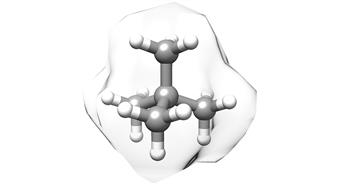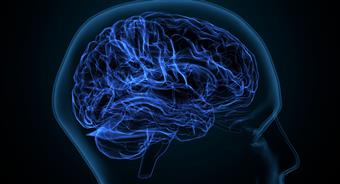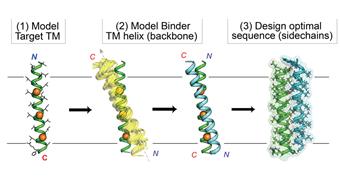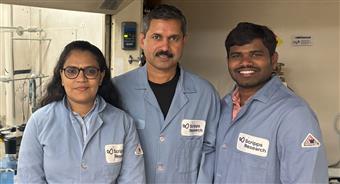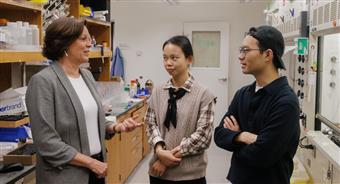
Humans may be capable of producing a quintillion different antibodies
January 23, 2019
LA JOLLA, CA An analysis by Scripps Research scientists of billions of distinct antibody-producing immune cells sampled from human volunteers indicates that the human antibody repertoire is far larger than was once thought.
The finding, reported online on January 21 in Nature, suggests that humans may be capable of producing as many as 1018, or one quintillion, distinct antibodies. The study also provides the largest single collection of antibody gene sequences to date, and points to the future medical use of antibody sequence information from individuals and large populations.
Antibody repertoire information could soon be used to diagnose autoimmune diseases and chronic infections, for example, or to design vaccines, says study lead author Bryan Briney, PhD, an assistant professor in the Department of Immunology and Microbiology at Scripps Research.
The study's senior author was Dennis Burton, PhD, co-chair of Scripps Research's Department of Immunology and Microbiology.
Antibodies are Y-shaped proteins that can grip bacteria, viruses and other biological targets very specifically and with high affinity as part of an immune response. They are produced by immune cells called B cells, which reside in the blood, spleen, lymph nodes and other tissues. B cells can be grouped into distinct clones, each of which produces antibodies with a unique set of target-gripping structures.
In principle, having the details of the antibody repertoire in individuals and in different populations would enable important scientific insights, as well as a wide range of medical applications. In practice, though, the amount of data involved has been considered prohibitively large. The billions of distinct arrangements of antibody genes in the B cells of an individual contain vastly more information than is in that person's entire genome.
Due to the difficulty of gathering and analyzing such enormous amounts of data, scientists until now have been able to make only rough, theoretical estimates of the total human antibody repertoire. A trillion possible antibodies are a commonly cited figure, Briney says.
The good news is that recent technological developments have sped up sequencing methods, making projects on this scale less daunting. We in our lab have also been able to develop software tools for processing billions of antibody sequences into a dataset that we can use, Briney says.
In the new study, he and his colleagues took blood samples from a group of 10 Californians between the ages of 18 and 30 that included men and women, Caucasians and African Americans. The researchers isolated the subjects' B cells and sequenced the cells' antibody genes. Focusing on the genes encoding the most variable, heavy chain segments of the antibodies' target-gripping structures, the scientists assembled almost 3 billion distinct sequences.
Their analysis of these sequences showed that each subject's antibody repertoire differed greatly, presumably due in part to their personal histories of infections and other immunological events. The analysis also suggested that, based on the repertoire diversity seen among these 10 people, the total human antibody repertoire could easily comprise as many as one quintillion a million trillion unique antibodies.
At the same time, the analysis showed there are some types of antibodies that most people tend to have. This is very exciting knowing these common features of the antibody repertoire should be very useful, for example, in designing vaccines, Briney says.
He and his team plan to follow up with further antibody-sequencing studies in larger groups of people from around the world. They also plan studies of antibody repertoires as potential tools for diagnosing diseases, revealing infection histories, and potentially informing other clinical applications.
Getting clinically relevant insights from this kind of information would be a big step forward, and we're hoping soon to do that, Briney says.
The authors of the study, Commonality despite exceptional diversity in the baseline human antibody repertoire, were Bryan Briney, Anne Inderbitzin, Collin Joyce, and Dennis R. Burton, all of Scripps Research.
The research was made possible by grants from the National Institute of Allergy and Infectious Diseases (UM1AI100663, U19AI135995), the International AIDS Vaccine Initiative (IAVI) through the Neutralizing Antibody Consortium (SFP1849), and the Ragon Institute of MGH, MIT, and Harvard.
Immunology & Microbiology Burton, Dennis Briney, Bryan Science News
More from Scripps
20/04/2024
New copper-catalyzed C-H activation strategy from Scripps Research Two-mode reactions inspired by human detox enzymes offer powerful new tools for drug discover...
12/04/2024
Scripps Research chemists devise easier new method for making a common type of building block for drugs Scientists transform simple linear amines into saturated...
06/04/2024
A simple, inexpensive way to make carbon atoms bind together A Scripps Research team uncovers a cost-effective method for producing quaternary carbon molecules,...
04/04/2024
Developing a vaccine for the zombie drug xylazine Scripps Research chemical biologists design an early proof-of-concept vaccine that could lead to the first...
30/03/2024
How blocking a neural receptor responsible for addiction could reduce alcohol use A Scripps Research team found that a new therapeutic that targets the kappa op...
13/03/2024
New computational strategy boosts the ability of drug designers to target proteins inside the membrane Customized-design approach could streamline the design of...
29/02/2024
Scripps Research scientists reveal how first cells could have formed on Earth New phospholipid discovery brings researchers closer to understanding how primordi...
29/02/2024
How molecular handedness emerged in early biology Scripps Research chemists fill a major gap in origin-of-life theories.
February 28, 2024
LA JOLLA, CA Mole...
22/02/2024
Snaking toward a universal antivenom Scripps Research scientists discovered antibodies that protect against a host of lethal snake venoms.
February 21, 2024
...
06/02/2024
Calibr-Skaggs announces expansion of option and license agreement with AbbVie to develop novel cell therapies for solid tumors and autoimmune diseases
AbbVie...
26/01/2024
Re-energizing mitochondria to treat Alzheimer's disease Scripps Research team restored neuron-to-neuron connections in human cells.
January 25, 2024
LA JO...
24/01/2024
100 years of Science Changing Life: Scripps Research celebrates a century of transforming human health For the last century, institute leaders and renowned scie...
23/01/2024
New technology lets researchers track brain cells' off switches The method could shed light on what goes awry in numerous brain conditions when neurons ar...
09/01/2024
Three decades of giving: Announcing the Calibr-Skaggs Institute for Innovative Medicines The ALSAM Foundation, founded by the Skaggs family, provides lasting g...
04/01/2024
Life science entrepreneur Gene Lay joins Scripps Research Board of Directors Lay, founder of the global biotech company BioLegend, brings invaluable experience ...
21/12/2023
Taming a plant-derived toxin Scripps Research team modifies the traditional poison picrotoxinin for potential neurological drugs and anti-parasite treatments. ...
19/12/2023
Scripps Research Executive Vice President Eric Topol gives TED talk on transformative power of AI in medicine Topol provides an overview of how AI models can i...
13/12/2023
New AI-powered algorithm could better assess people's risk of common heart condition Early detection of atrial fibrillation can reduce the risk of stroke an...
07/12/2023
Nanoparticle flu vaccine design shows promise in early tests Scripps Research-designed vaccine could provide broad, enduring protection against influenza A str...
16/11/2023
Numerous Scripps Research scientists named Highly Cited Researchers Clarivate's annual, global list represents researchers who have demonstrated significant...
07/11/2023
Multiple sclerosis drug invented at Scripps Research slows long-term devastating disease progression Late-breaking data reinforces the effectiveness and safety ...
05/10/2023
Keren Lasker named a 2023 Moore Inventor Fellow The prestigious award will support Lasker's inventive research in membraneless organelles and their applica...
22/09/2023
Michael Bollong named a 2023 Amgen Young Investigator The prestigious award will support Bollong's research identifying new molecular targets and therapeuti...
09/09/2023
Philip Dawson receives 2024 American Chemical Society National Award Dawson is honored with the Arthur C. Cope Late Careers Scholar Award for his foundational c...
07/09/2023
Scripps Research chemists devise a method for C-H activation of alcohols The method represents a new toolkit for making drugs and other compounds.
September 06...
31/08/2023
Scripps Research receives $1.5M to surveil infectious disease threats in wastewater Bill & Melinda Gates Foundation award to support the development of multi-pa...
16/08/2023
How cold temperatures trigger the brain to boost appetite Scripps Research scientists' discovery could lead to new weight loss and metabolic health treatmen...
08/08/2023
Human antibody that targets carfentanil, fentanyl and related opioids reverses overdose effects in preclinical study Scripps Research-developed antibody therapy...
04/08/2023
How sensory neurons impact the gut Scripps Research scientists show that the receptor PIEZO2 in sensory neurons controls gut motility and transit time, which a...
26/07/2023
AbbVie and Calibr Expand Strategic Collaboration to Advance Several Preclinical and Early-stage Clinical Assets The expanded strategic collaboration will advan...
23/07/2023
Scripps Research scientists develop AI-based tracking and early-warning system for viral pandemics Machine-learning system effectively predicts emergence of pro...
19/07/2023
Monitoring T cells may allow prevention of type 1 diabetes Scripps Research study shows that analyzing T cells in blood samples could be used to select at-risk ...
19/07/2023
Scripps Research mourns passing of leading organic chemist Albert Eschenmoser Eschenmoser pioneered key reactions in synthetic chemistry and shaped the understa...
15/06/2023
Scripps Research awarded $46.8 million by NIH to promote human health through innovative translational science and training The Translational Institute is harne...
13/06/2023
Scripps Research's Danielle Grotjahn named 2023 Pew Scholar in the Biomedical Sciences The award will support Grotjahn's study of how cells assemble the...
31/05/2023
Crossing the ring: new method enables C-H activation across saturated carbocycles Scripps Research chemists add another powerful tool to their molecular editin...
24/05/2023
Scripps Research develops behind-the-scenes tool for better biomedical data discovery The new resource makes datasets more discoverable for life science communi...
19/05/2023
Scripps Research neuroscientist Hollis Cline elected to American Academy of Arts and Sciences Cline is recognized for her discoveries about the role of sensory ...
19/05/2023
Scripps Research's Skaggs Graduate School awards doctoral degrees to 31st graduating class Commencement ceremony will be livestreamed via Zoom and on instit...
13/05/2023
A better route to benzocyclobutenes, sought-after building blocks for drugs Scripps Research chemists devise a new, C-H activation-based method for the synthesi...
09/05/2023
Renowned Scripps Research professor Jeffery Kelly elected to National Academy of Sciences Kelly's groundbreaking work on protein misfolding has led to thera...
28/04/2023
Mirror-image molecules pave new path for cancer drug discovery By comparing how mirror image versions of small molecules impact clusters of proteins, Scripps R...
22/04/2023
How alcohol consumption contributes to chronic pain A Scripps Research team showed how both alcohol intake and alcohol withdrawal can lead to increased pain and...
21/04/2023
Xin Jin receives dual awards to study autism risk genes in neurodevelopment Major grants from the National Institutes of Health and California Institute for Reg...
20/04/2023
Trim the sugar: New HIV vaccine design improves immune response Scripps Research vaccine candidate headed for clinical trials.
April 19, 2023
LA JOLLA, CA A...
18/04/2023
Therapeutic can seek and destroy potent opioid to treat overdoses Scripps Research chemists developed a new biologic to work against the synthetic opioid carfen...
07/03/2023
How heavy alcohol consumption increases brain inflammation The findings by a Scripps Research team point toward a potential new drug target for treating alcohol...
02/03/2023
Scientists find human antibodies that can block multiple coronaviruses including SARS-CoV-2 Results from a Scripps Research and UNC team pave the way for a vacc...
28/02/2023
$10 million grant funds Scripps Research Alcohol Research Center through its 50th year The five-year grant supports research into the neurobiology of alcohol us...
28/02/2023
Immune system drug shows promise in treating alcohol use disorder, a Scripps Research clinical trial reports Scientists at Scripps Research found that apremilas...
 Humans may be capable of producing a quintillion different antibodies
Humans may be capable of producing a quintillion different antibodies 















